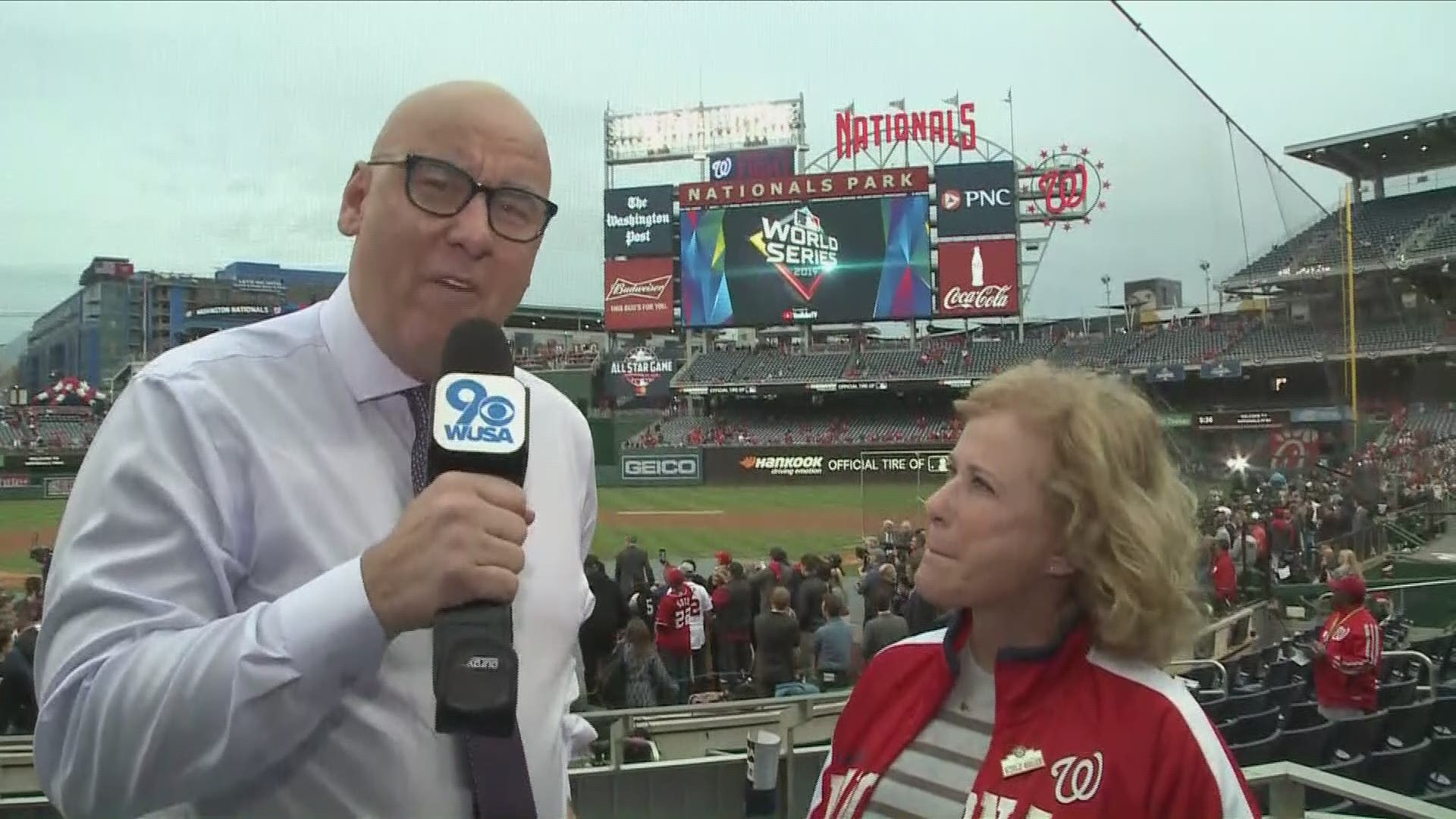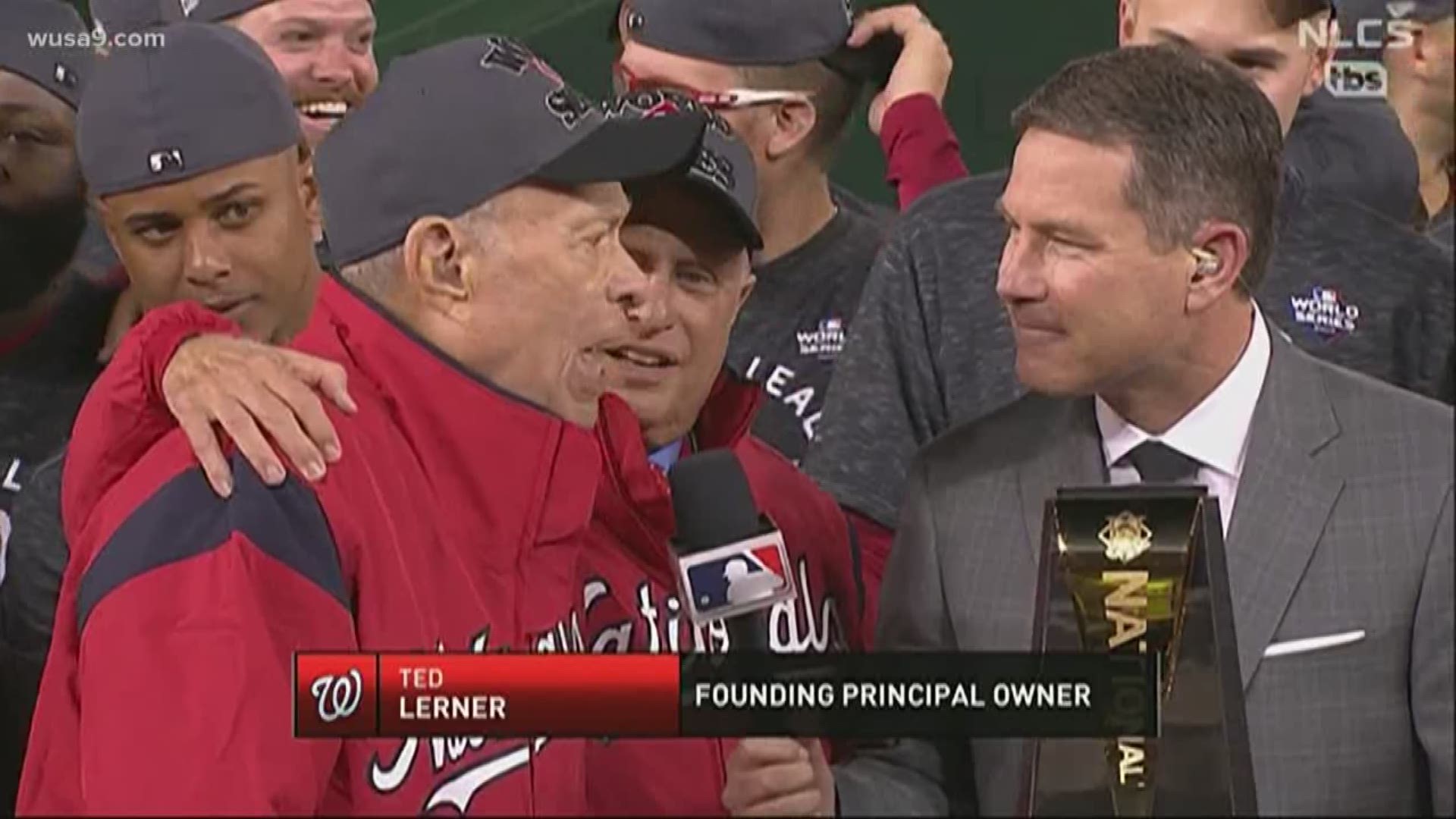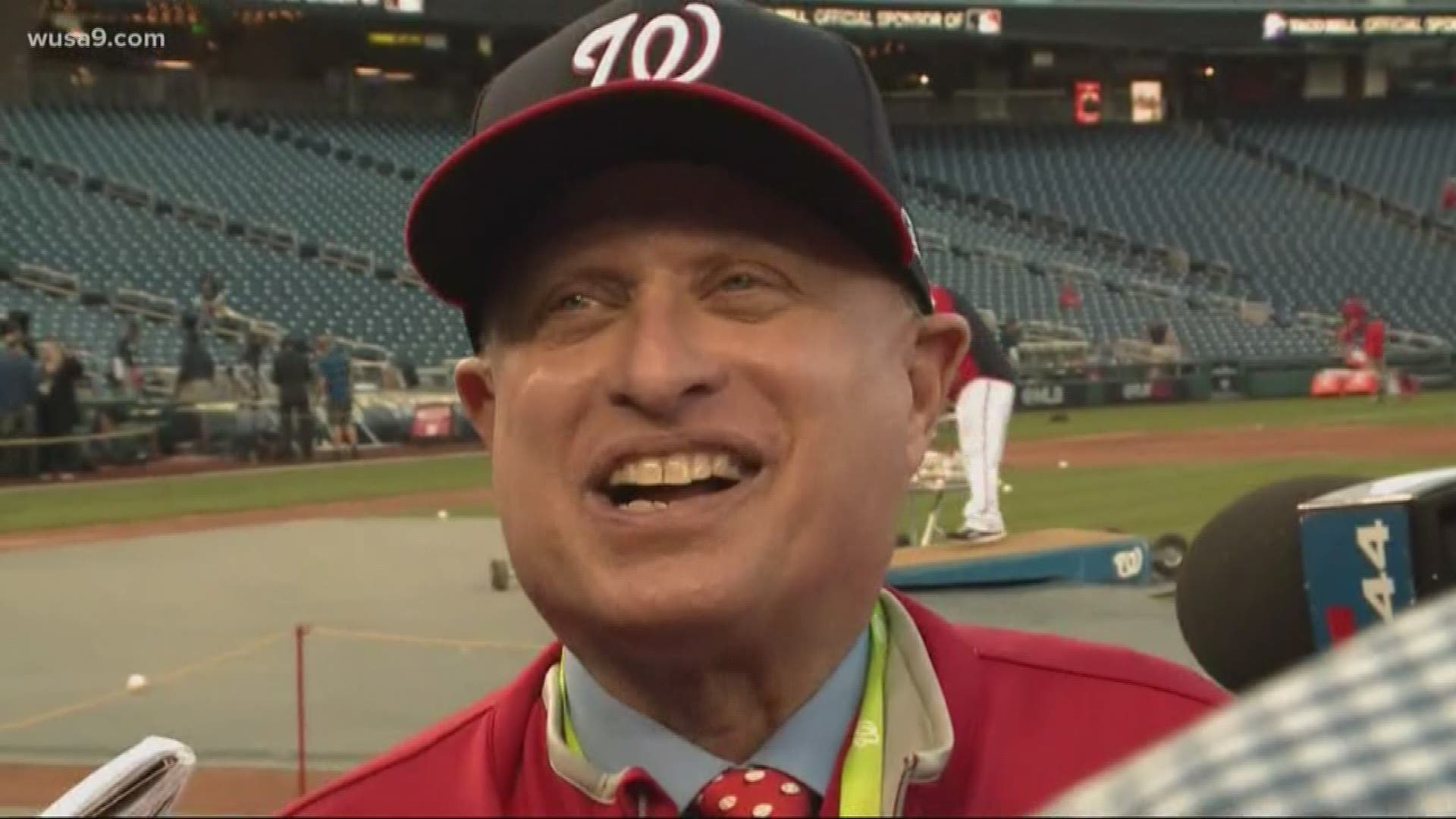WASHINGTON — Long before Wednesday night in Houston, long before the madness of a Game 7 was even a dream for her family, Marla Lerner Tanenbaum, the daughter of Washington Nationals owner Ted Lerner, said she “enjoyed” baseball. But she said it casually, the same way someone might say they “enjoyed” a grilled cheese sandwich, or a familiar song on their car stereo -- pleasant, but nothing life-altering.
This was 2006, of course, just after her then-80-year-old father purchased the Washington Nationals from Major League Baseball, the year Marla had no loyalties to the Orioles, the Yankees, the Red Sox or any team for that matter. She knew so little about the Grand Old Game then that she has a confession to make now:
“The first thing I did when we were given the team is buy ‘Baseball for Dummies,’ so that tells you all need to know,” said Marla, president of The Annette M. and Theodore N. Lerner Family Foundation, chair of the Washington Nationals Dream Foundation and, oh, and one of the couple’s three grown children with a family of her own.
Soon after she bought that book, it happened for Marla, just as it did for so many Washingtonians who had not had a major league team since 1971, the year the Senators bolted for Minnesota.
She woke to a new day -- a new life, really -- and the only difference between her and the tens of thousands of Nationals fans that came to love and loathe so many moments at the ballpark the next 14 years was that, by association, she was partly responsible for the experience.
What’s more, as much as she might have liked a certain role player or star, Marla’s duties in the organization did not encompass retaining or obtaining players. So, for instance, when a journeyman catcher who played for the Montreal Expos and migrated to Washington with the Nationals was released, she grew melancholy like any fan who had grown to like a player.
Her brother, Mark Lerner, 66, whom Ted turned over the principal ownership duties to a year ago, still teases her about having feelings about that catcher.
"My brother mocks me endlessly but, yes, I had a favorite: Brian Schneider," Marla says. “Why? Because probably he was the first person I knew that was let go. And so that was just the first time I was aghast that, you know, they didn’t keep him.”
Resplendent in her Nationals windbreaker, denim jeans, and medium-high boots, Marla spoke to WUSA exclusively in front of the seats behind the dugout at Nationals Park while the World Series was in town.
Taking the patriarch's cue, the Lerners are known for being fiercely private and rarely give interviews. In point of fact, no one knew why Mark was missing from his usual seat in the Nationals Park stands in 2017 until he wrote a letter to the Washington Post that summer, revealing that complications from cancer in his left leg following surgery and radiation treatment forced doctors to amputate.
“The limb was removed in early August and I’m healing well, cancer-free, and looking forward to my eventual new prosthetic,” he wrote to the newspaper matter-of-factly.
Aside from answering a few questions from print reporters during batting practice, neither Mark nor any member of the family has given one-on-one interviews this postseason. Ted has turned down all requests.
“I’m a more outgoing person than Dad,” Marla explained, smiling. “ He’s just not out there shaking hands. He’s not a glad-hand kinda guy.”
But he is a worker. He’s always been a worker.
When you ask Marla whether “Dad,” who turned 94 the night the Nationals won the National League Championship Series over the St. Louis Cardinals, would be validated as Major League Baseball owner if Washington won Game 7, she smiled.
“I think every fan in Washington, D.C. would be over the moon,” Marla said. “How could you not be? But it’s an aspiration I sometimes thought was a little silly because he’d already accomplished so much in life. If he had this or had that or if he didn’t have this or have that, he still would’ve had a very full and rewarding career and family and all that.
“But again, it’s like the cherry on top. It’s really sweet.”
Some American life, no?
Theodore Lerner’s father, Mayer, emigrated to America from Palestine in 1921. He married a Lithuanian immigrant, Ethel, and they settled into a rowhouse in a Jewish neighborhood in Northwest Washington, along Georgia Avenue. After a short time working for a clothing company, Mayer went into real estate. He bought fixer-uppers, remodeled them and flipped them for better resale values.
The oldest of three children, Ted was able to buy tickets to Griffith Stadium to see the Washington Senators play because a bleacher seat cost just 25 cents in the 1930s, and that was about his take home for selling magazines in the neighborhood.
“Considering where he came from and he was brought up….” Marla begins. “He was an usher at Griffith Stadium. You know he was the breadwinner for his family? He was just 21 years old when he lost his dad.”
In 1946, Mayer died on his son’s 21st birthday. Until several of his nine grandchildren came along in the past two decades, Ted Lerner never celebrated his birthday – even as he began forging his own Horatio Alger tale.
He started his real estate career with just $250, borrowed from his wife, Annette, whom he married in 1951. In 2013, Ted told Forbes Life Magazine he grossed just $1,050 in his first year.
Today, Lerner Enterprises is a multi-billion-dollar colossus encompassing 20 million square feet of commercial and retail space in and around Washington, more than 22,000 private homes and an estimated 7,000 apartments. Moreover, Ted built and managed most of the area’s malls -- including both malls at Tysons Corner, the now-defunct White Flint, Landover, and Dulles Town Center and Wheaton Plaza. He also helped build Washington Square, the prime office space on Connecticut Avenue and L Street downtown.
In 2006, when he bought the team, Forbes estimated Lerner's net worth sat at $1.5 billion, which at the time made him the 242nd richest American. This year’s Forbes estimates his wealth at more than $5.1 billion, which pushed him up to No. 128 on the wealthiest list in the United States. The family is reportedly worth more than Jack Dorsey, who founded Twitter, and Howard Shulz, the Starbucks’ magnate.
"I have great respect for journalistic institutions, but don’t believe everything you read,” cautioned Marla, humbly playing down the family’s wealth. Asked kiddingly if she liked to be referred to as “Heiress to the Lerner Family Fortune” or the “Driving Force Behind the Nationals’ Youth Baseball Academy,” she laughed and said the latter would make her happier.
It’s actually been her passion since Nationals Park opened in 2008.
"When we were given the privilege of running this team, we wanted to make a big impact in a serious way in the community,” she said. “And the youth baseball academy literally hits it out of the park in every respect.
“Baseball, softball is an integral part of the program and of course that’s what gets the kids to come. But the educational part of it, the academic enrichment, the nutrition support, the mentoring, all that, make the sports possible too.”
The mission statement is simple: “The Washington Nationals Youth Baseball Academy uses the sports of baseball and softball as vehicles to foster positive character development, academic achievement and improved health among youth from underserved communities in Washington, D.C.”
But in the sport of Major League Baseball, which before and after Jackie Robinson broke the color barrier in 1947 became such a large part of African-American culture, it takes on a greater meaning. American-born black players now represent just 7 percent of major league rosters. (Howie Kendrick and Michael Taylor are the lone African-American players on the Nationals’ roster.)
“The only way to increase the minority participation in Major League Baseball is you’ve gotta start at the beginning, right?” Marla asked rhetorically. “You gotta start with the kids. And the younger the better.”
Tal Alter, the chief executive officer of the academy and a former college player, and a self-proclaimed “baseball guy, through and through,” backed up Marla’s thoughts:
"It’s not even about giving back,” Alter said. “I think this is a responsibility that we have. We are a civic entity in this city. People look at us to be a beacon of light in a lot of different ways. “And so, yes, we can raise money and give it in the form of grants and support organizations that are doing good work. But we also think we can shine a light on the need in this city and ensure that we’re convening people to come together and meet that need.”



